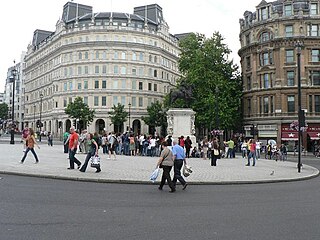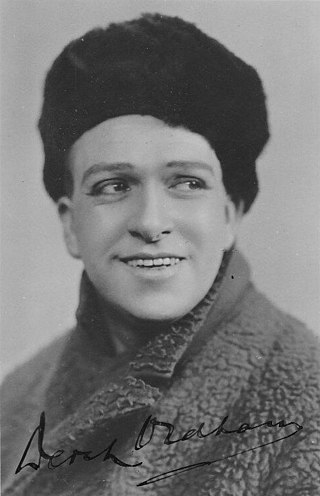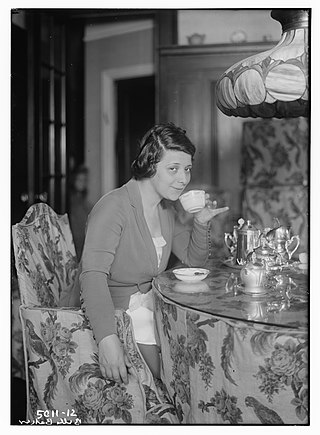
Charing Cross is a junction in Westminster, London, England, where six routes meet. Since the early 19th century, Charing Cross has been the notional "centre of London" and became the point from which distances from London are measured. Clockwise from north, the routes that meet at Charing Cross are: the east side of Trafalgar Square leading to St Martin's Place and then Charing Cross Road; the Strand leading to the City; Northumberland Avenue leading to the Thames Embankment; Whitehall leading to Parliament Square; The Mall leading to Admiralty Arch and Buckingham Palace; and two short roads leading to Pall Mall.

Finchley is a large district of north London, England, in the London Borough of Barnet. Finchley is on high ground, 7 mi (11 km) north of Charing Cross. Nearby districts include: Golders Green, Muswell Hill, Friern Barnet, Whetstone, Mill Hill and Hendon.

Sir John Mills was an English actor who appeared in more than 120 films in a career spanning seven decades. He excelled on camera as an appealing British everyman who often portrayed guileless, wounded war heroes. In 1971, he received the Academy Award for Best Supporting Actor for his performance in Ryan's Daughter.

Derek Oldham was an English singer and actor, best known for his performances in the tenor roles of the Savoy Operas with the D'Oyly Carte Opera Company.

June Clyde was an American actress, singer and dancer known for roles in such pre-Code films as A Strange Adventure (1932) and A Study in Scarlet (1933).

The Phoenix Theatre is a West End theatre in the London Borough of Camden, located in Charing Cross Road. The entrances are on Phoenix Street and Charing Cross Road. The Phoenix Theatre was built on the site of a former factory and then music hall Alcazar before.

Belle Baker was a Jewish American singer and actress. Popular throughout the 1910s and 1920s, Baker introduced a number of ragtime and torch songs including Irving Berlin's "Blue Skies" and "My Yiddishe Mama". She performed in the Ziegfeld Follies and introduced a number of Irving Berlin's songs. An early adapter to radio, Baker hosted her own radio show during the 1930s. Eddie Cantor called her “Dinah Shore, Patti Page, Peggy Lee, Judy Garland all rolled into one.”

Charing Cross is a major road junction and area within the centre of Glasgow, Scotland. It is situated north of the River Clyde at the intersection of Sauchiehall Street, St George's Road, Woodlands Road, North Street and Newton Street, as well as being at a major interchange of the M8 motorway. Charing Cross marks the notional boundary between the City Centre and the West End of the city.

The Criminal is a 1960 British neo-noir crime film directed by Joseph Losey and starring Stanley Baker, Sam Wanamaker, Grégoire Aslan, Jill Bennett, and Margit Saad. Baker plays Johnny Bannion, a recently-paroled gangster who is sent back to prison after robbing a racetrack, with both the authorities and the criminal underworld looking for the money.
Broughton Rangers were one of the twenty-one rugby clubs which met at the George Hotel, Huddersfield, in 1895 to form the Northern Rugby Football Union. They were originally based in Broughton, Salford, but in 1933 moved to Gorton, Manchester to play at the Belle Vue Stadium, and were renamed Belle Vue Rangers in 1946. The club folded in 1955.
The Stotts were a family of architects from Oldham, North West England, of Scottish descent who specialised in the design of cotton mills. James Stott was the father, Joseph and his elder brother Abraham Stott had rival practices, and in later years did not communicate. Their children continue their practices.
Walter C. Hackett was an American-British playwright.
The transport system now known as the London Underground began in 1863 with the Metropolitan Railway, the world's first underground railway. Over the next forty years, the early sub-surface lines reached out from the urban centre of the capital into the surrounding rural margins, leading to the development of new commuter suburbs. At the turn of the nineteenth century, new technology—including electric locomotives and improvements to the tunnelling shield—enabled new companies to construct a series of "tube" lines deeper underground. Initially rivals, the tube railway companies began to co-operate in advertising and through shared branding, eventually consolidating under the single ownership of the Underground Electric Railways Company of London (UERL), with lines stretching across London.

Albert Pierre de Courville was a writer and director of theatrical revues, many of which featured the actress and singer Shirley Kellogg, whom he married in June 1913.

Rutland Mill was a cotton spinning mill on Linney Lane, in Shaw and Crompton, Greater Manchester, England. It was built by F. W. Dixon & Son in 1907 for the Rutland Mill Co. Ltd. It was taken over by the Lancashire Cotton Corporation in 1935. By 1964, it was in the Courtaulds Group. In the late 1980s, as Courtaulds moved operations to other parts of the world, the mill was bought by Littlewoods who demolished it and replaced it with a new automated storage warehouse.
Magnet Mill, Chadderton is a cotton spinning mill in Chadderton, Oldham, Greater Manchester. It was built by the Magnet Mill Ltd. in 1902, but purchased by the Lancashire Cotton Corporation in 1935. It was later taken over by the Courtaulds Group. Ceasing textile production in December 1966, it was demolished soon after. A suburban residential estate now occupies this site. It was driven by a 2200 hp twin tandem compound engine by George Saxon & Co, Openshaw, 1903. It had a 27-foot flywheel with 35 ropes, operating at 64½ rpm.

Royton Ring Mill was a cotton mill in Royton, Greater Manchester, England. It was built in 1908 and extended in 1912. It was taken over by the Lancashire Cotton Corporation in 1935 and passed to Courtaulds in 1964. Production finished in 1966. It was extended again in 1969 and used for other purposes. It has now been demolished, the street has been renamed and houses have replaced it.

The Case of Gabriel Perry is a 1935 British crime film directed by Albert de Courville and starring Henry Oscar, Olga Lindo and Margaret Lockwood.

The Midshipmaid is a 1932 British comedy film directed by Albert de Courville and starring Jessie Matthews, Frederick Kerr, Basil Sydney and Nigel Bruce. The film is based on the 1931 play of the same title by Ian Hay and Stephen King-Hall. it was released in the U.S. as Midshipmaid Gob. John Mills makes his film debut in a supporting role. It was shot at the Lime Grove Studios, with sets designed by the art director Alfred Junge.
The Middleton Electric Traction Company Ltd. operated an electric tramway service in Middleton, England between 1902 and 1925. It was a subsidiary company of the British Electric Traction group,.













